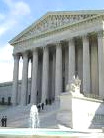| The U.S. Supreme Court needlessly chipped away at First Amendment free-speech guarantees with a ruling elevating a high-school prank to a dangerous promotion of drug use. The 6-3 ruling miscast the case before the court as about drugs. But it was about a student's right to speech. Five years ago, high-school senior Joseph Frederick stood across the street from his school and unfurled a 14-foot banner that read "Bong Hits 4 Jesus." Frederick and other students from the Juneau, Alaska, school were just off school property attending a nonschool event, an Olympic Torch relay. Frederick's sign was ambiguous. Was the 18-year-old supporting drugs or Christianity? The ambiguity matters because it places Frederick's sign within the confines of protected speech. Supreme Court members, in a majority opinion written by Chief Justice John Roberts, convinced themselves that Frederick's banner was a public promotion of the use of illegal drugs. School authorities, according to Roberts — joined by Justices Thomas, Scalia, Alito and Kennedy — did not violate Frederick's constitutional rights when they went across the street, snatched his sign and ripped it to shreds. The Supreme Court recognized student political speech with its 1969 decision, Tinker v. Des Moines (Iowa) School District. Justice Stephen Breyer, while siding with the majority, asserts that Frederick and his bong-hits banner make for an inadequate foundation on which to limit students' right to political speech. The court's dissenters - Justices John Paul Stevens, David H. Souter and Ruth Bader Ginsburg - go further. Stevens, penning the dissent, called the student's banner "nonsense" and the court's ruling a reach for broad censorship that would ban speech that advocated for medicinal marijuana use or other related messages. The majority worries that illegal drugs are a serious danger in schools. This argument gets some sympathy but not enough to trample on the First Amendment. |





